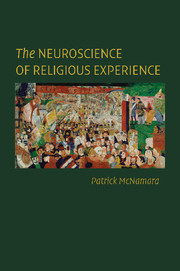Book contents
- Frontmatter
- Contents
- Preface
- Acknowledgments
- 1 God and the Self
- 2 On the Self and the Divided Self
- 3 Mechanisms and Dynamics of Decentering
- 4 Neurology of the Self
- 5 Neurology of Religious Experiences
- 6 Neurochemistry of Religiosity
- 7 Self-Transformation as a Key Function of Performance of Religious Practices
- 8 Self-Transformation through Spirit Possession
- 9 God Concepts
- 10 Religious Language
- 11 Ritual
- 12 Life-Span Development of Religiosity and the Self
- 13 The Evolution of Self and Religion
- References
- Index
1 - God and the Self
Published online by Cambridge University Press: 30 October 2009
- Frontmatter
- Contents
- Preface
- Acknowledgments
- 1 God and the Self
- 2 On the Self and the Divided Self
- 3 Mechanisms and Dynamics of Decentering
- 4 Neurology of the Self
- 5 Neurology of Religious Experiences
- 6 Neurochemistry of Religiosity
- 7 Self-Transformation as a Key Function of Performance of Religious Practices
- 8 Self-Transformation through Spirit Possession
- 9 God Concepts
- 10 Religious Language
- 11 Ritual
- 12 Life-Span Development of Religiosity and the Self
- 13 The Evolution of Self and Religion
- References
- Index
Summary
The personal in man is just that in him which he does not have in common with others, but in that which is not shared with others is included the potentiality of the universal. But personality is not part of the universe, the universe is a part of personality, it is its quality. Such is the paradox of personalism.
– Nikolai Berdyaev, 1949, p. 22In the quote above, the Russian philosopher Berdyaev hints at the “personalist” idea that the Self, while utterly unique, nonetheless contains a universal content that makes the Self an end in itself. The Self is something that cannot be regarded as a means to some end no matter how praiseworthy, but rather is an end that is irreplaceable, precious, and infinitely valuable. Its dignity lies in its rationality, its universal content, its irreplaceability – a consciousness that can deliberate rationally about moral ends and choose the good and the true.
This book will examine religion through the eyes of this Self. There are, of course, many ways to study religion, but I believe an approach to religion through the lens of the Self will prove especially fruitful because one of religion's major self-proclaimed aims is the salvation of the individual Self. Despite the Self's great dignity and worth, it is treated by religion as conflicted and in need of salvation.
- Type
- Chapter
- Information
- The Neuroscience of Religious Experience , pp. 1 - 20Publisher: Cambridge University PressPrint publication year: 2009



